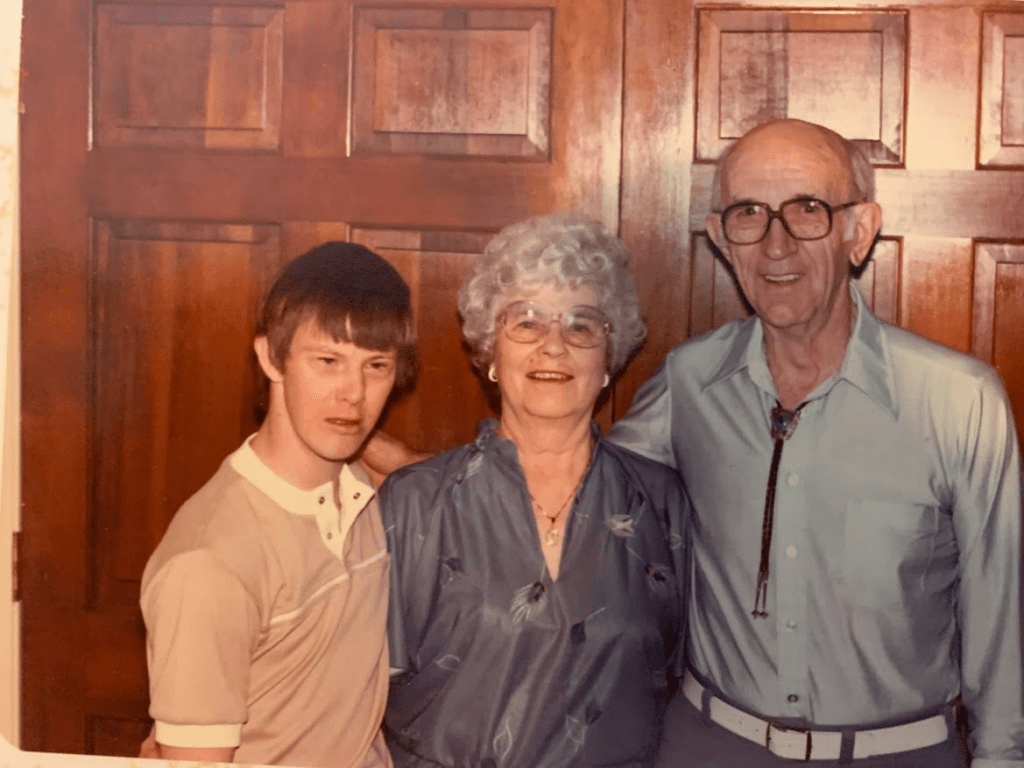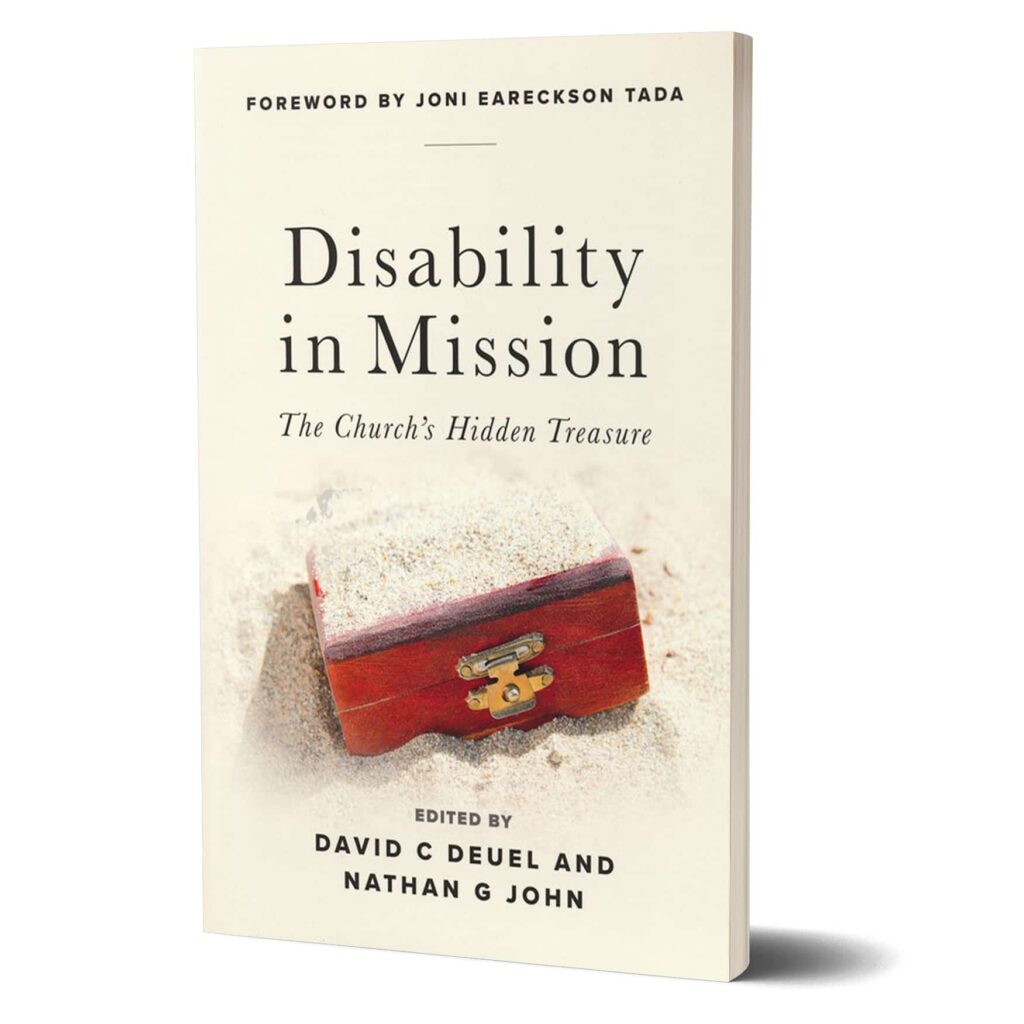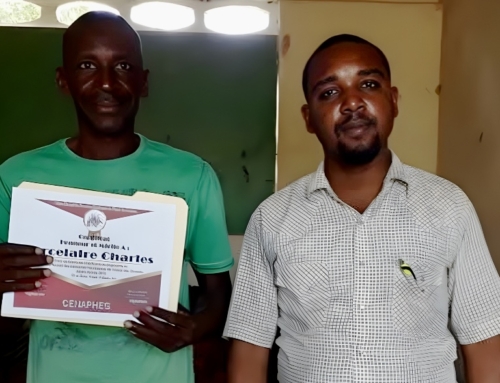The Caregiver Few Expected

More times than not, people with disabilities are the recipients of care from parents, siblings, loved ones, and medical practitioners.
This fact of life has led many to view them only as care receivers and never as caregivers.
And this means that oftentimes, the disability is seen rather than the person. But many people living with disabilities have been given a special sensitivity to the needs of others, making them especially suited to provide help in situations where dedicated care is lacking. Take, for example, the life of Don Schmidt…
Don was born on February 14, 1950 and was soon diagnosed with Down syndrome. The doctors recommended that he be institutionalized immediately as they felt he could not lead a normal life and would probably die young. Thankfully, my grandparents, Wilbur and Opal Schmidt, never considered this an option. They brought him home and loved him unconditionally. At this time, my grandmother was almost forty-three and had two other children in their late teens.
Don grew up with all the other children in the family and was allowed to do what they were doing: climb trees, ride bikes, swim, and hike.

He tagged along with his father, who was a carpenter, helping wherever he could. Until he turned eighteen, Don attended a school exclusively for mentally and physically handicapped children. The school focused on teaching skills for daily living and to meet basic job requirements. Don learned well and was a willing worker, although he was hindered by his limited vocabulary. He did learn the alphabet and numbers. He could tell time, write his name, and even read some words by sight.
Don loved a routine. He did the same things at the same time every day. He woke up early, made his bed, dressed, ate, completed his chores, ate, washed the dishes, completed more chores or pursued other activities, ate, did the dishes again, watched a few TV shows, and went to bed early. Having a place for everything and having everything in its place were always a must. If it was the day to mow the lawn, come rain or shine the lawn was mowed.
As an adult, he occasionally held small jobs, but for the most part helped his parents around the home, and with their work and church activities. Because he made friends easily, all welcomed him. His familiar “Hi, Pal” was the standard greeting for everyone. Ladies were often told, “You look nice,” and given a hug. In fact, Don was a little bit spoiled. Family and friends gave him attention and showered him with love. It’s possible he was a little overprotected, but never could it be said he was undisciplined.
In January 1987, Don’s father suffered a massive stroke that left him paralyzed and unable to speak.
He was in the hospital and rehabilitation unit for eight weeks. During this time, Don rarely left his side. If Wilbur went to physical therapy, Don went along. The therapists taught him how to transfer his dad from the bed to a chair, how to push him in a wheelchair, and how to walk him with a belt around his waist for balance. When it was time for speech therapy, Don went along, and the therapists worked with him too. If Don hadn’t been able to lift his dad, help him dress, and do the other heavy work necessary, Wilbur would have gone from the hospital to a care facility instead of back home. But Don took on the task of caring for Wilbur as a serious job. For example, he started by pushing his dad around the block in the wheelchair each day. As Wilbur’s condition improved, Don helped him push the empty wheelchair around the block, and then walked with Wilbur as he progressed to a walker and eventually a cane.
At times, when Don felt helpless to meet the needs of his ailing father, he would say, “Call Jim (their pastor). Pray.”
After Jim came and prayed with them, Don felt at peace and could carry on again. Jim and the associate pastor, Bob, made themselves available day and night, which was a great comfort to the family as well as to Don. During the six years his father lived following the stroke, Don was always ready to help. He became very attentive to his dad’s special needs. By watching the clock, he anticipated what should come next and was waiting to take care of the next meal, medication, or treatment needed. He learned to fix simple meals like soup and sandwiches, made sure glasses were filled, and washed the dishes when meals were through.
Wilbur died in January 1992. Understandably, Don took it hard. He wanted to “go clouds” with his father. But he didn’t have much time to dwell on this. The very next week, it was confirmed that his mother, Opal, had a cancerous tumor that would require radiation treatments. Don again rose to the occasion and began caring for her. He went to the treatments with her and made friends with the other patients and health care workers.
When the treatments were finished, Opal regained her strength. Life was just getting back to normal when she developed another tumor.
At this point, she felt she could endure no more treatments and wanted to live out her days without medical intervention. The family supported her decision. Within a few months, her health began to deteriorate rapidly. Again, had it not been for Don, care in her own home would not have been possible. The other family members would come in the morning and usually stay most of the day to help Don take care of meals, baths, medications, and so on.

The usual nighttime routine included having one of the family members read a Bible passage and pray with Opal. Then Don would be alone with his mother through the night. Don could tell time and followed instructions well, so he was quite trustworthy when it came to giving medications (as long as they were set out in cups marked with the prescribed time). Around this period, Opal’s older sister came to visit from Colorado.
Upon seeing what a help Don was, she remarked she wished he had a twin so she could take someone like him home with her.
As time went on, more help was needed. Arrangements were made for hospice workers to come several times a week to assess Opal, bathe her, change her linens, and give the family a break. Things went this way for about two months. Then, one night Opal called Don a couple of times more than she normally did. After taking care of everything he felt was necessary, Don, being tired and wanting to sleep, answered her next summons with the response, “Call 911!” Although the family chuckled over the humor in this, it was clear Don had reached his limit. He needed help at night too. Shortly thereafter, Opal and Don moved in with Bonnie, Don’s older sister, and her husband, Kenny. This allowed Don to get used to the home where he would be living once his mother passed away.
Don continued to be involved in Opal’s care to the very end.
It was hard for him to see his mother in pain and to watch her health deteriorate, but it allowed him to prepare for her going. The family had been concerned about how Don would react to her death, but he adjusted well to her also “going clouds” when she died in January 1993.
Today, Don continues to live with Bonnie and Kenny. He attends a Sunday school class for handicapped adults at their church. He is involved with a city group that does activities on a routine basis and has participated in the Special Olympics. He is active and healthy and a joy to the family.
When a child is born with a disability, people often ask, “Why?” In the case of Don, we cannot help but wonder, “If he had been born typical, would he have been too busy with his own career and family to have had time to care so well for his parents in the final years of their lives?”
As it is, all who know Don love him, accept him, and are thankful for who he is.
Postscript: Don continued to live with Bonnie and Kenny for the next sixteen years. He remained as helpful to them and their neighbors as he had been to Wilbur and Opal. One of the jobs he loved to do was to take the garbage cans out to the curb on trash pick-up day and then bring them back in later. He began doing this for a beloved neighbor who was having some medical issues and then spontaneously began doing it for all ten houses on their block.
As he entered his mid-fifties, he began to experience behavioral changes. Uncharacteristic for Don, he would forget what he should do next in his routine and would sometimes spend several days at a time sleeping and not eating. His primary care physician said that all adults with Down syndrome develop some type of dementia if they live long enough. For Don, it was Alzheimer’s.
The periods of lethargy and forgetfulness got more frequent to the point that family members were no longer familiar faces; he lost weight and became bedridden, requiring round-the-clock care. Finally, in the late summer of 2009, Bonnie and Kenny could no longer care for Don at home, as it had become too taxing physically, and they found a group care home close by that had a place for him.
Three weeks later, Don passed away.
At his memorial service, he was remembered as someone who made others feel special with his excitement, his hugs and his ready “Hi Pal.” He was cremated, and his ashes, along with Opal and Wilbur’s, were spread at the family property where they had built a summer cabin many years before.
Written By—Terri Fagerlie and Dave Deuel, PhD

Disability in Mission
Disability in Mission: The Church’s Hidden Treasure outlines a radical change in approaches to missiology, missions, and praxis for the twenty-first-century global cultural context. It explores a pattern whereby God works powerfully in missions through disability and not in spite of it.





